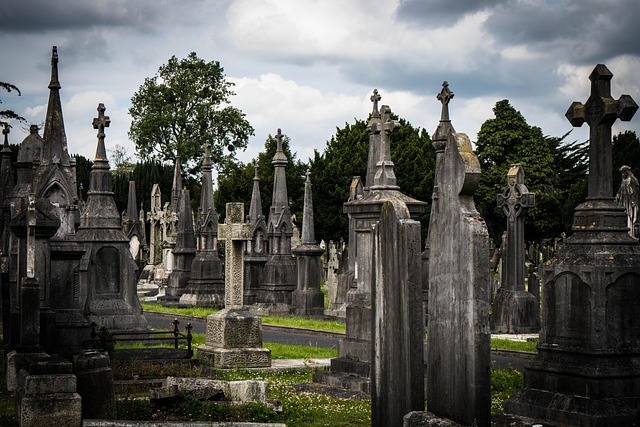Funeral Assistance Programs provide vital support to unemployed individuals and their families, easing financial burdens associated with end-of-life arrangements through grants, subsidies, or reimbursements for funeral expenses. To qualify, one must meet specific criteria like unemployment due to layoffs or health conditions or active job search with demonstrated need. These benefits act as a safety net during grief and transition, ensuring access to dignified send-offs for struggling households. Accessing these benefits involves checking local government or social services departments, gathering essential documents, completing applications accurately, and staying informed during the processing period. Case studies of Sarah and David illustrate the profound impact of these programs on vulnerable populations navigating life's toughest transitions.
Many unemployed individuals face significant financial challenges, including the cost of funeral arrangements. This article explores Funeral Assistance Benefits tailored for those in unemployment, offering a lifeline during difficult times. We delve into understanding these programs, eligibility criteria, and the various forms of financial support available. Learn how to access these benefits, with practical tips on application processes. Real-life case studies highlight their impact, and we provide guidance for effective planning to maximize assistance. Discover how these initiatives can ease the burden of funeral expenses during unemployment.
- Understanding Funeral Assistance Programs for Unemployed People
- Eligibility Criteria: Who Qualifies for These Benefits?
- The Types of Financial Support Available
- How to Access and Apply for Funeral Plan Financial Benefits
- Case Studies: Real-life Impact on Unemployed Individuals
- Tips for Effective Planning and Maximizing Assistance
Understanding Funeral Assistance Programs for Unemployed People

Funeral Assistance Programs are designed to offer support and financial benefits to unemployed individuals and their families during a difficult time. These programs recognize that unexpected deaths can bring about significant financial strains, especially when facing job loss and limited resources. By providing assistance with funeral planning and costs, these initiatives aim to ease some of the financial burdens associated with end-of-life arrangements.
Unemployed people may find themselves eligible for various forms of aid, including grants, subsidies, or reimbursements for funeral expenses. These programs often collaborate with local communities, non-profit organizations, or government bodies to ensure that everyone has access to a dignified send-off, regardless of their current employment status. Understanding these assistance options is crucial in navigating through challenging times and ensuring a proper Funeral Plan Financial Benefits.
Eligibility Criteria: Who Qualifies for These Benefits?

Unemployed individuals often face a multitude of challenges, and accessing funeral assistance benefits can be a crucial support system during difficult times. To qualify for these financial aid programs designed to help with funeral planning, one must meet specific criteria. Typically, this includes being unemployed due to circumstances beyond their control, such as company layoffs or long-term health conditions that have led to income loss.
The eligibility also extends to those who are actively seeking employment and in between jobs, provided they can demonstrate financial need. These benefits aim to alleviate the burden of funeral expenses, which can be a significant financial strain on already-struggling households. By ensuring access to a decent send-off, these programs contribute to a supportive safety net for the unemployed during their time of grief and transition.
The Types of Financial Support Available

When facing unemployment, individuals often worry about financial constraints, including the cost of funeral arrangements. Fortunately, several types of financial support are available to help ease this burden. Many life insurance policies offer death benefits that can be used towards funeral expenses, providing a safety net during difficult times. Additionally, government assistance programs and non-profit organizations frequently offer grants or loans specifically designed to help with funeral planning, ensuring that financial situations don’t prevent proper send-offs.
Funeral plan financial benefits extend to various services. This includes coverage for traditional funerals, cremations, and even green burials, ensuring options tailored to different preferences and budgets. Some programs also assist with the cost of caskets, urns, and other necessary items, making it possible for unemployed individuals to plan meaningful ceremonies without the added financial stress.
How to Access and Apply for Funeral Plan Financial Benefits

Accessing and applying for funeral plan financial benefits can seem daunting, but there are clear steps to ensure a smooth process. Firstly, individuals should check with their local government or social services department to inquire about available programs. Many regions offer specific support for the unemployed, including assistance with funeral expenses. These programs often require proof of unemployment status and may have specific application forms that need completion.
Once eligible programs are identified, applicants should gather essential documents, such as identification, proof of income (or lack thereof), and any relevant benefits or welfare statements. Completing the application accurately and honestly is crucial. After submitting the application, there may be a waiting period while the request is processed. During this time, it’s beneficial to stay informed about the status of the claim and keep all necessary records handy for easy reference.
Case Studies: Real-life Impact on Unemployed Individuals

Funeral assistance benefits for the unemployed offer a much-needed safety net during an already challenging period. These programs have a profound impact on individuals who are not only dealing with job loss but also facing the emotional and financial burden of planning a funeral. Real-life case studies highlight how these benefits can provide a sense of security and ease the financial stress associated with end-of-life arrangements.
One such story involves Sarah, a former teacher who lost her job due to budget cuts. Faced with the sudden realization of her limited savings, she was grateful for a funeral assistance program that covered a portion of the burial expenses. This support allowed Sarah to focus on her well-being and rebuild her life without the added worry of financing a funeral. Similarly, David, a long-time construction worker, benefited from a government initiative that provided financial assistance to unemployed individuals planning a funeral. This gesture not only eased his financial burden but also offered him time to grieve and heal during this difficult transition in his life.
Tips for Effective Planning and Maximizing Assistance

Creating a funeral plan while unemployed can seem daunting, but proactive steps can help maximize available financial benefits. Start by understanding the assistance offered through government programs or non-profit organizations tailored for the unemployed. These may include grants for burial expenses or discounted services from cemeteries and funeral homes. Keep detailed records of all costs, from caskets to transportation, to ensure every eligible expense is accounted for when applying for aid.
Additionally, consider building a support network that can contribute to your funeral plan financially. Friends and family might be willing to chip in, especially if you provide them with clear information on what assistance is needed. Also, explore options like crowdfunding platforms designed for end-of-life expenses. Effective planning not only ensures your final wishes are respected but also leverages available resources to ease the financial burden during an emotionally challenging time.
Unemployed individuals facing financial burdens can find solace in knowing that funeral assistance benefits exist to support them during difficult times. By understanding eligibility criteria, exploring available support options, and accessing these programs efficiently, those in need can receive much-needed relief when planning a funeral. This article has provided an overview of funeral plan financial benefits, offering practical insights for maximizing assistance. Remember, seeking help is not a sign of weakness but a responsible step towards ensuring a dignified send-off for loved ones.







